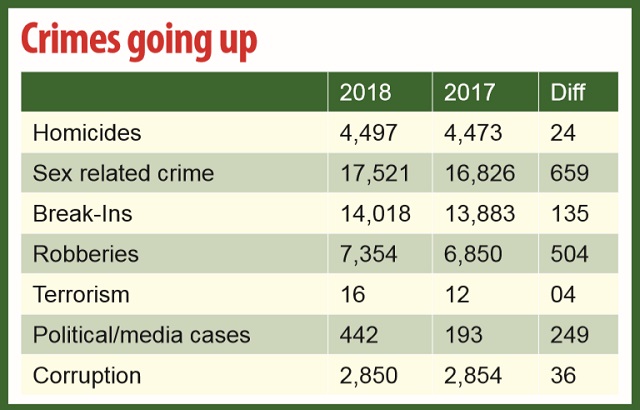
Top on the list are stopping the role of police in commission crimes, and increasing militarization and politicization of police. These are closely followed by low pay and worsening living conditions and welfare of police officers.
One analyst described these as the structural issues of the police force; including that the police are among the least paid government workers. Yet with the likes of Sabiiti from the military at the top, the police constantly have to work with the richest and most entitled in the government. This breeds frustration, resentment, and lethargy. Many police officers are professional; they know what must be done but are unwilling to do.
Sabiiti who is said to be a strict, result oriented disciplinarian thinks he can jolt the frustrated police officers into action with threats.
“Failure to respond to emergency calls by a police officer will result in disciplinary action,” he says. It is not clear how that will work.
But his predecessor, Gen. Kale Kayihura faced the same problem. Kayihura instinctively understood that, in policing, public cooperation is more important than any activity that a police officer can make. He pushed the community policing concept hard. But Kayihura realised that police has another major problem. The public does not trust the police.
An analyst told The Independent that the lack of trust goes beyond the police. It is a general lack of trust in the government. But in the police’s case, the lack of trust is driven by the high rate of police involvement in the commission of crimes and corruption. Dealing with organizational culture change is long term. Kayihura wanted quick results. He did four things; first he pushed hard for more military officers to join the police force. This enabled him to place his favoured men in influential positions. Secondly, he sourced and threw more money into policing. This gave police officers incentive to work. Thirdly, he decided to recruit criminals to catch criminals. This enabled him to get critical intelligence on criminals quickly. Finally, he policed politics aggressively, especially the brutal suppression of the opposition to President Museveni. This bought him political cover.
Army overshadows police
Like Kayihura, Sabiiti now heads a police force that is resigned to army command. President Museveni appointed Sabiiti in April 2017 and in July followed up Sabiiti’s appointment with appointment of three army generals to top positions in the police force. Museveni appointed Brigadier Godfrey Golooba to be Director Human Resource and training, Brigadier Jack Bakasumba as Joint Chief of Staff, and Col. Chris Ddamulira as the Director Crime Intelligence.
But mixing police and army creates a cocktail of fire and dynamite. According to retired UPDF Colonel, Fred Bogere, who once served as an Army MP in Parliament, Museveni’s deployment of military personnel in the Uganda Police Force is a sign that there is something wrong going on.
“The root cause of the current criminality comes from politicizing the security sector,” Bogere said in an interview with NTV, “The government needs to get back to the drawing board to look at security as a basic need that everybody needs.”
Bogere wants the military out of police because, he says, the military cannot be a solution to everything and removing the military “would restore confidence in the career police personnel who at the moment feel demoralized.”
Sylvie Namwase, a researcher on militarization, sustainable growth and peace in Uganda, has written that “… clarity and harmony of standards is especially important as there’s an increasing blurring of police and military roles in the country.”
Some commentators have pointed at links between the militarization and the military-style training the Uganda police force has been getting from North Korea. They said these raise questions of legitimacy when the police try to impose law and order. According these analysts, politicization breeds overzealousness; a belief among some police officers that they are defending what is right against a wrong opposition force.
At the Oct.18 press conference where he released his plan, Sabiiti was flanked by the Uganda Army Commander of Land Forces, Lt. Gen. Peter Elwelu, the no-nonsense general who allegedly brutally quelled the Kasese riots leaving many civilians dead. Elwelu’s presence at police headquarters for this important meeting appeared to communicate that the police would now possibly pursue a shoot to kill policy.
The police force already has such a unit; the so-called Rapid Response Unit which is manned mainly by military officers clad in police uniform. It is the latest remodeling of the “Operation Wembley” which was headed by UPDF’s Col. Kayanja and overseen by Gen. Katumba Wamala who was the first army general to head police. The operation had a shoot-to-kill policy. It clearly did not work.
Sabiiti Makara, a professor of political science at Makerere University told The Independent on Oct. 22 that Sabiiti needs to tackle what Makara called “the missing link in all the current debate” – the role of the LC system.
In the past, the local councils had a very active role in the security system at village level. But the security roles have been grabbed by military-style Local Defence Units (LDUs) and the LCs have been relegated to signing letters and adjudicating domestic conflicts.
Makara told The Independent that embedding the LDUs with the military and police is a mistake.
“In the past, when LDUs were recruited from within the population and stayed within the population,” Makara said, “they performed much better than the current LDUs who are quite attached to the military.”
****
 The Independent Uganda: You get the Truth we Pay the Price
The Independent Uganda: You get the Truth we Pay the Price


